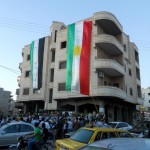Syria: Fueling a false image of the Kurdish struggle
 They do not exist, said Syria.
They do not exist, said Syria.
They were not Syrians. Their citizenship was taken away from them, they were not allowed to travel outside the country, their way through the educational system was impeded.
They were not Kurds either. They were not allowed to speak Kurdish in schools, formation of Kurdish organisations was forbidden, it was not allowed to openly celebrate Kurdish holidays, their land was taken away from them and given to Arabs as part of the arabification. To this day Kurds merely shrug when asked why an Arab family is living in tents on the farms they have owned for generations.
Kurdish singers made women the object of their love songs as they could not publicly profess their affection to the greatest love of their life, Kurdistan.
They were left in a state of neglect and oblivion by the state of Syria and the silence of the Syrian people. Despite living in this limbo for many years that has taken a psychological toll on them, the Kurds have preserved their culture and language. The Kurdish language is spoken in every Kurdish home, forbidden poetry and tapes by Kurdish artists sold in secret and Newroz celebrated at home behind closed doors and in the dark, the only light came from small candles.
Things have improved but only to a certain extent. Being a Kurd within Syria is still like walking on burning ground, the general distrust from the Syrian people is obvious.
The origin of the mistrust stems from years of propaganda and misrepresentation, particularly from state-owned media.
Prior to the uprising, the Assad regime shifted between two standpoints towards the Kurds in Syria, said a member of a former Kurdish council.
Either the Kurdish people did not exist or it was seeking to create division in Syria. The Baath party impressed upon the Syrian people the perception of Kurds as a divisive factor in the country.
One would have hoped this propaganda would die out with the Assad regime when and if it is overthrown but it does not seem to be the case.
It is a notion nutured by the Syrian opposition consisting of the Free Syrian Army (FSA) and the Syrian National Coalition, not to mention Turkey. The rhetoric of the Syrian regime is being used by the people opposing that same regime and fighting in the name of freedom and democracy.
This is why a dialogue between the Syrian opposition and the Kurdish people is not easy, especially when Turkey is whispering into their ears that Kurds are seeking to create a self-governed region, for them a violation of territorial integrity.
The Syrian opposition and Turkey claim that Kurds are surely allies of Bashar al-Assad seeing as regime troops quietly left control of Kurdish towns to the Kurds.
But we do not have to go far back to a time when the Turkish prime minister would be seen in a close, brotherly embrace with Assad. Neither has it been forgotten that the Syrian people did not stand up for the Kurds killed during the 2004 uprising in the Kurdish city of Qamişlo.
The German magazine zenith spoke with a contact person for the military council in Hasake who mentioned that Turkey is their most important ally against the Kurds. He said: “There are no mountains here in Syria, the Kurds do not belong here. We are freeing Arab cities.”
“There are no mountains here in Syria” is a reference to the Turkish oppressive mentality of denying the existence of Kurds and simply identifying them as “Mountain Turks.”
Are Kurds not part of the revolution against the regime? Have Kurds not suffered and still suffers under the dictatorship of Assad? Have they not suffered under the torn, unidentified plight of being stateless, neither recognised as a Kurd nor a Syrian yet still subjected to the double oppression of both people?
It benefits an agenda to portray Kurds as a divisive people, an agenda shared by the Syrian opposition and the Turkish government. There is an enthusiasm to make them seem unwelcomed. It is a lost cause.
Kurds have not come to stay in Syria. They were born to stay in Kurdistan.
Comments are closed.